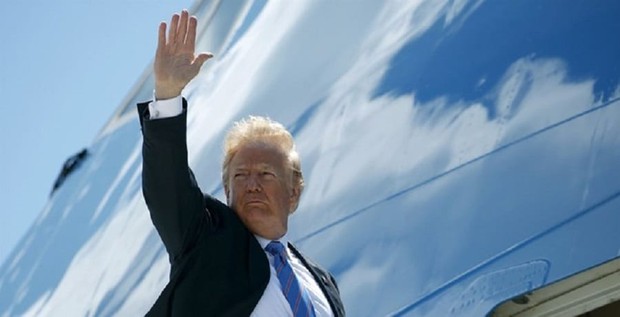
President Donald Trump boards Air Force One for a trip to Singapore to meet with North Korean leader Kim Jong Un, Saturday, June 9, 2018, at Canadian Forces Base Bagotville, in Canada. (AP Photo/Evan Vucci)
A lot of time and energy are being spent by the left trying to frame both the G7 meeting yesterday and Trump’s summit with North Korea’s Kim Jong Un as failures.
https://twitter.com/Doranimated/status/1006215544910082052
On CNN just now, Ben Rhodes said right before he left Obama met with Justin Trudeau and said he must take the reins now, and that Obama passed the torch to Justin.
It's official- we must topple the Trudeau regime.
— Comfortably Smug (@ComfortablySmug) June 10, 2018
Ben Rhodes on MSNBC just said how important it is to make sure you get inspections in any nuclear deal …
— Elizabeth Harrington (@LizRNC) June 11, 2018
This is to be expected. The media spent eight long years trying to convince us that Obama was a foreign policy savant. They did this because a) the media aren’t terribly bright themselves and b) they confuse glib with smart so they frequently think other glib but not terribly bright people are really, really smart. I would contend that by any measure you choose, that America entered 2017 in a much weaker position than it had been in 2009.
Part of the criticism of Trump’s actions on the international stage stem from the fact that he has never sat down with Tom Friedman or some other really, really smart person and laid out the Trump doctrine for them and convinced them that the Trump Doctrine works. The Atlantic’s Jeff Goldberg, once an indefatigable fluffer for the Obama administration and now an equally indefatigable critic of Trump (see my last paragraph for why that is), takes it upon himself to define Trump’s foreign policy. He actually does a pretty good job of it but is unable to get past his own snark to see how it is playing out in the real world.
Many of Donald Trump’s critics find it difficult to ascribe to a president they consider to be both subliterate and historically insensate a foreign-policy doctrine that approaches coherence. A Trump Doctrine would require evidence of Trump Thought, and proof of such thinking, the argument goes, is scant. This view is informed in part by feelings of condescension, but it is not meritless. Barack Obama, whose foreign-policy doctrine I studied in depth, was cerebral to a fault; the man who succeeded him is perhaps the most glandular president in American history. Unlike Obama, Trump possesses no ability to explain anything resembling a foreign-policy philosophy. But this does not mean that he is without ideas.
Goldberg’s MO doesn’t seem to involve reading any of the policy statements strategy papers that have been churned out by Defense, State, and the NSC–there may be reason for that, perhaps Trump hasn’t looked at them either. That would not be an unusual thing. (When I was stationed in Germany, Bundeswehr officers often, only half-jokingly, said that the US Army would defeat the Soviets in a war because the Soviets had studied our doctrine and had developed their doctrine to counter ours; but that no American officer had studied their own doctrine.)
Over the past couple of months, I’ve asked a number of people close to the president to provide me with short descriptions of what might constitute the Trump Doctrine. I’ve been trying, as part of a larger project, to understand the revolutionary nature of Trump’s approach to world affairs. This task became even more interesting over the weekend, when Trump made his most ambitious move yet to dismantle the U.S.-led Western alliance; it becomes more interesting still as Trump launches, without preparation or baseline knowledge, a complicated nuclear negotiation with a fanatical and bizarre regime that quite possibly has his number.
Trumpian chaos is, in fact, undergirded by a comprehensible worldview, a number of experts have insisted. The Brookings Institution scholar (and frequent Atlantic contributor) Thomas Wright argued in a January 2016 essay that Trump’s views are both discernible and explicable. Wright, who published his analysis at a time when most everyone in the foreign-policy establishment considered Trump’s candidacy to be a farce, wrote that Trump loathes the liberal international order and would work against it as president; he wrote that Trump also dislikes America’s military alliances, and would work against them; he argued that Trump believes in his bones that the global economy is unfair to the U.S.; and, finally, he wrote that Trump has an innate sympathy for “authoritarian strongmen.”
This is just cheap ad hominem which hides a grain of truth. Trump supports the existing international order to the precise extent to which it works to his liking and advantage and not a bit more. NATO is stronger and more robust under Trump than it was under Obama. The UN appears to be working less horribly with Nikki Haley as US Ambassador than under the Samantha Power who spent more time eavesdropping on Americans than she did on advancing American interests.
The third-best encapsulation of the Trump Doctrine, as outlined by a senior administration official over lunch a few weeks ago, is this: “No Friends, No Enemies.”
As shocking as this may seem to some, this has historically been the foreign policy of just about every country. George Washington reminded up in his Farewell Address:
In the execution of such a plan, nothing is more essential than that permanent, inveterate antipathies against particular nations, and passionate attachments for others, should be excluded; and that, in place of them, just and amicable feelings towards all should be cultivated. The nation which indulges towards another a habitual hatred or a habitual fondness is in some degree a slave. It is a slave to its animosity or to its affection, either of which is sufficient to lead it astray from its duty and its interest. Antipathy in one nation against another disposes each more readily to offer insult and injury, to lay hold of slight causes of umbrage, and to be haughty and intractable, when accidental or trifling occasions of dispute occur. Hence, frequent collisions, obstinate, envenomed, and bloody contests. The nation, prompted by ill-will and resentment, sometimes impels to war the government, contrary to the best calculations of policy. The government sometimes participates in the national propensity, and adopts through passion what reason would reject; at other times it makes the animosity of the nation subservient to projects of hostility instigated by pride, ambition, and other sinister and pernicious motives. The peace often, sometimes perhaps the liberty, of nations, has been the victim.
So likewise, a passionate attachment of one nation for another produces a variety of evils. Sympathy for the favorite nation, facilitating the illusion of an imaginary common interest in cases where no real common interest exists, and infusing into one the enmities of the other, betrays the former into a participation in the quarrels and wars of the latter without adequate inducement or justification. It leads also to concessions to the favorite nation of privileges denied to others which is apt doubly to injure the nation making the concessions; by unnecessarily parting with what ought to have been retained, and by exciting jealousy, ill-will, and a disposition to retaliate, in the parties from whom equal privileges are withheld. And it gives to ambitious, corrupted, or deluded citizens (who devote themselves to the favorite nation), facility to betray or sacrifice the interests of their own country, without odium, sometimes even with popularity; gilding, with the appearances of a virtuous sense of obligation, a commendable deference for public opinion, or a laudable zeal for public good, the base or foolish compliances of ambition, corruption, or infatuation.
Or as British Foreign Secretary Lord Palmerston said more succinctly:
“We have no eternal allies, and we have no perpetual enemies. Our interests are eternal and perpetual, and those interests it is our duty to follow.”
If you think other nations aren’t following the same route, you are sadly mistaken. Why is Germany spending about 1% of GDP on Defense? Because it perceives no physical threat and so NATO defense spending target be damned. In other words, it has no loyalty to NATO beyond the security NATO can provide. If there is no security threat, Germany acts in its own interests.
The second-best self-description of the Trump Doctrine I heard was this, from a senior national-security official: “Permanent destabilization creates American advantage.”
Flux, uncertainty, and, indeed, chaos creates opportunities…if you see them and are able to grasp them. Quite honestly, I think this and “No Friends, No Enemies” go hand in hand. Trump has acted in the best interests of the nation, or of the coalition that elected him. You may not like what he’s done, but to view it as some kind of bull-in-the-china-shop crisis is just dumb. There is nothing that has happened to date in foreign policy that Trump didn’t say he was going to do. The only people who were surprised were the internationalists who didn’t believe anyone would send a herd of sacred cattle off to the packing house.
Climate change agreement? Check. TPP? Check. Iran nuclear deal? Check. Defeat ISIS? Check. Reduce Syrian refugee flow to the US? Check. Become Israel’s best friend? Check. Push back on unfair trade deals? Check. None of these things would have happened if the decisions had been produced after exhaustive inter-agency debates. Quite the opposite. Each of these actions has created some instability in international systems. In some of those instances of instability we may be substantially reshaping affairs. Just today the New York Times is reporting that Communist China is anxiety stricken because they have been shut out of the Trump-Kim summit and they don’t know what agreements might be reached. I would contend that Merkel and Macron and Trudeau need the US in the G7 much more than the US needs to be in the G7 and because of that, the food fight on Saturday is ultimately going to shake up some things in a way that conventional diplomacy never would have. And if it doesn’t? We all know that Trump will just forget about it and go on like it never happened. If you look at China, on the one hand Trump is personally complimentary of Xi, but we have slapped a major fine on a Chinese telecom company, imposed tariffs on their imports, and sent US warships into waters China claims. Much the same can be said for our relations with Russia. Yes, Trump made noises about readmitting them to the G7. At the same time we’ve sent anti-tank missiles to Ukraine, applied sanctions today against several Russian firms with Kremlin ties for cyber attacks, and we hammered Russia harder over the nerve agent attack on a Russian emigre in Britain than the Brits did. All of this creates uncertainty. All of it creates options or keeps options open.
The best distillation of the Trump Doctrine I heard, though, came from a senior White House official with direct access to the president and his thinking. I was talking to this person several weeks ago, and I said, by way of introduction, that I thought it might perhaps be too early to discern a definitive Trump Doctrine.
“No,” the official said. “There’s definitely a Trump Doctrine.”
What is it?, I asked. Here is the answer I received:
“The Trump Doctrine is ‘We’re America, Bitch.’ That’s the Trump Doctrine.”
I have to agree. This is the tagline to Trump’s overarching strategy. But, when you put all the parts together you heard this over and over during the 2016 campaign. America First. Not America Alone. But the statement that America will ultimately act in America’s best interests. And, oh yeah, I forgot, we’re America, Bitch.
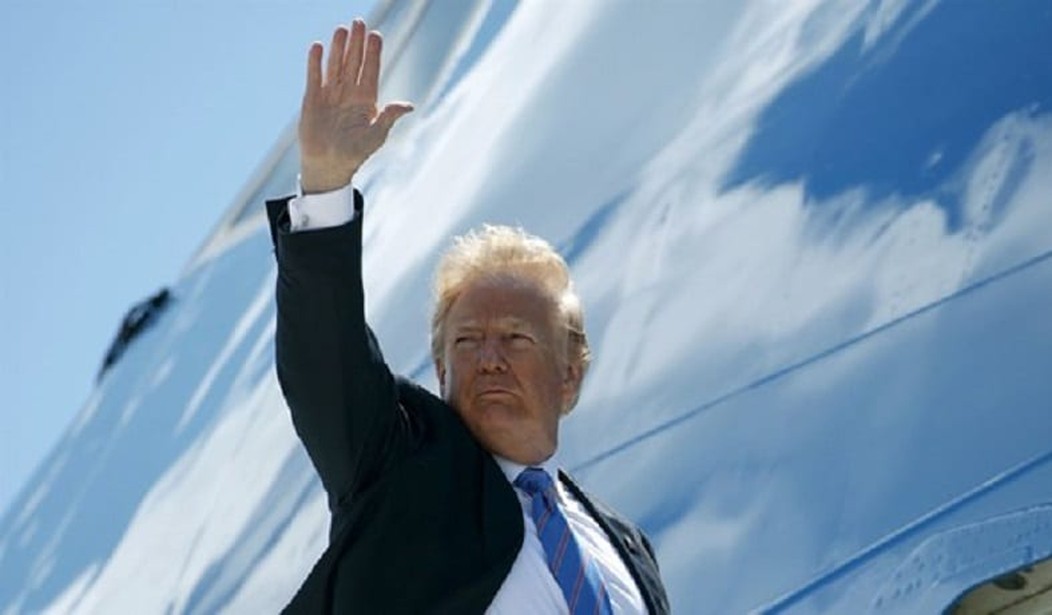
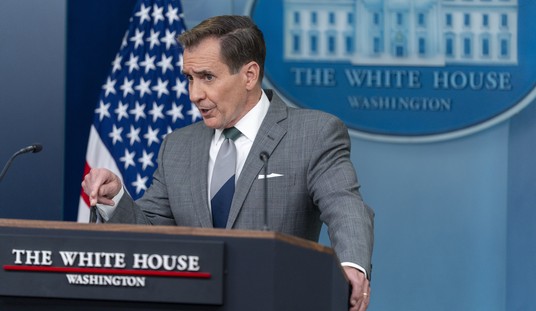
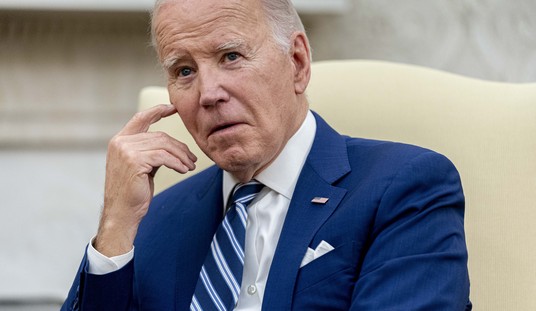









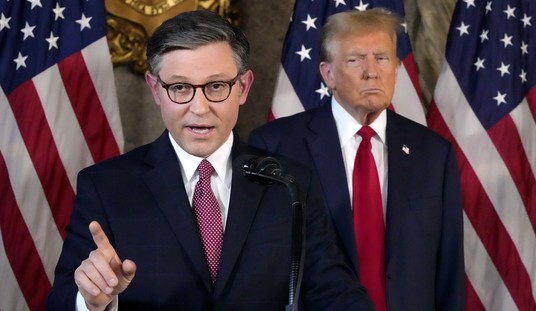

Join the conversation as a VIP Member